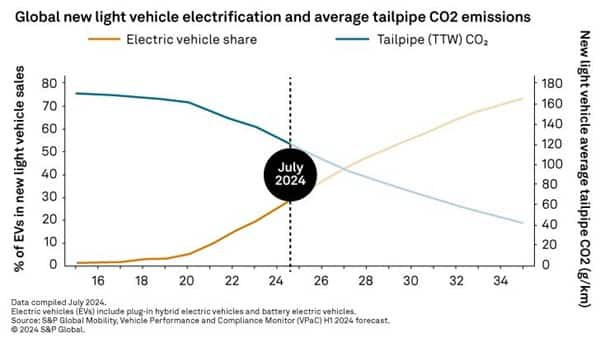Customer Logins
Obtain the data you need to make the most informed decisions by accessing our extensive portfolio of information, analytics, and expertise. Sign in to the product or service center of your choice.
Customer LoginsThe Global Automotive Industry and the Energy Transition
As a result of electrification efforts, S&P Global Mobility projects that the global new light vehicle fleet's average tailpipe CO₂ emissions will drop about 75% from 2015 through 2035. But this drop is not without its challenges. Our whitepaper "Automakers' Decarbonization Efforts in Action" explores the progress and challenges in the decarbonization efforts of automakers, with a particular focus on the transition to battery electric vehicles (BEVs) and the reduction of carbon emissions throughout the value chain.
Key takeaways:
- The growth of battery electric vehicles (BEVs) has been slower than initially expected due to factors such as high upfront costs, limited charging infrastructure, inconsistent regulations, and consumer preference for hybrid options. However, the adoption of BEVs is expected to accelerate in the coming years as battery technology improves, costs decrease, charging infrastructure expands, and government policies support BEVs.
- Automakers are facing the challenge of decarbonizing their value chain, with a focus on reducing Scope 3 emissions, particularly in the use phase of vehicles. Some automakers have set aggressive carbon reduction targets, while others have opted for more moderate approaches. The transition to BEVs is expected to contribute to a significant reduction in global CO2 emissions from vehicles.
- The decarbonization efforts need to shift upstream to the automotive supply chain as the demand for batteries to support BEV deployment increases. This will require addressing the increased energy and material inputs associated with vehicle supply chains and ensuring sustainable sourcing practices.

Download the complete whitepaper
This article was published by S&P Global Mobility and not by S&P Global Ratings, which is a separately managed division of S&P Global.
